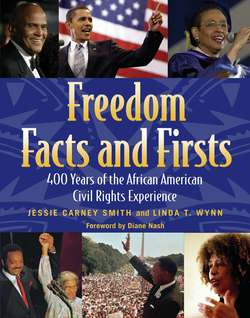Читать книгу Freedom Facts and Firsts - Jessie Carney Smith - Страница 42
На сайте Литреса книга снята с продажи.
Johnson, James Weldon (1871–1938)
ОглавлениеJames William Johnson was the second child of James and Helen Louise Johnson. Born June 17, 1871, in Jacksonville, Florida, he developed the beliefs of a free thinker early; later in life, he changed his middle name to Weldon. James Weldon Johnson offered a unique and uncommon expression of who he was and what he would become. When Johnson graduated from Atlanta University in 1894 he attended the Chicago World’s Fair and heard presentations by Frederick Douglass and Paul Laurence Dunbar. Douglass’s commitment to uplift and Dunbar’s mastery and respect for language, black speech, and culture reflected two aspects of Johnson’s life and talent that would be consistent throughout his many professional successes.
Johnson, who became principal of Stanton School in Jacksonville that same year, expressed his views on the conditions of blacks in the rural South and set about to educate the adult black community by founding the newspaper The Daily American. Finding he had further talents in the area of music, Johnson spent time on Broadway writing songs with his brother, John Rosamond Johnson.
Concerned about stereotypes prevalent in popular music, he took courses at Columbia University to further explore his literary interests. While serving as treasurer of the Colored Republican Club in New York, he accepted a diplomatic post in Puerto Cabello, Venezuela, in 1906 and later transferred to Corinto, Nicaragua, in 1909. He completed his novel The Autobiography of an Ex-Coloured Man (1912) while in Nicaragua and had it published anonymously. After resigning from diplomatic service in 1913, Johnson returned to the states.
James Weldon Johnson (Fisk University).
Becoming an editorial writer for the periodical New York Age, he continued to advocate for equal rights. In 1916 Joel E. Spingarn, who served as chair and then president of the NAACP, offered Johnson a position as the NAACP’s first field secretary. In this office, Johnson organized branches in the South and led protests against injustices. In 1919 he led a delegation to see President Woodrow Wilson to protest death sentences given to black soldiers after the Houston, Texas, race riots of 1917. Also in 1919, having proven himself an effective organizer and spokesman for the cause of civil rights, Johnson became general secretary of the NAACP. Johnson worked relentlessly, investigating injustices and championing voting rights. The overall demands of this position took a toll on Johnson, however, and he took a leave of absence on two occasions because of exhaustion.
Johnson resigned from the position as general secretary in 1930 and devoted himself to his writing on a full-time basis, while still championing the cause of civil rights. In his writings, he advocated integration as the solution to segregation and America’s race problems. He saw the inequities in the American system and found his voice in the traditions of black culture to express and explore the history, experience, and opportunities deserved by black Americans. Johnson died on June 26, 1938, but he left a lasting legacy as a renaissance man with a vested interest in the rights of his people.
Lean’tin L. Bracks
